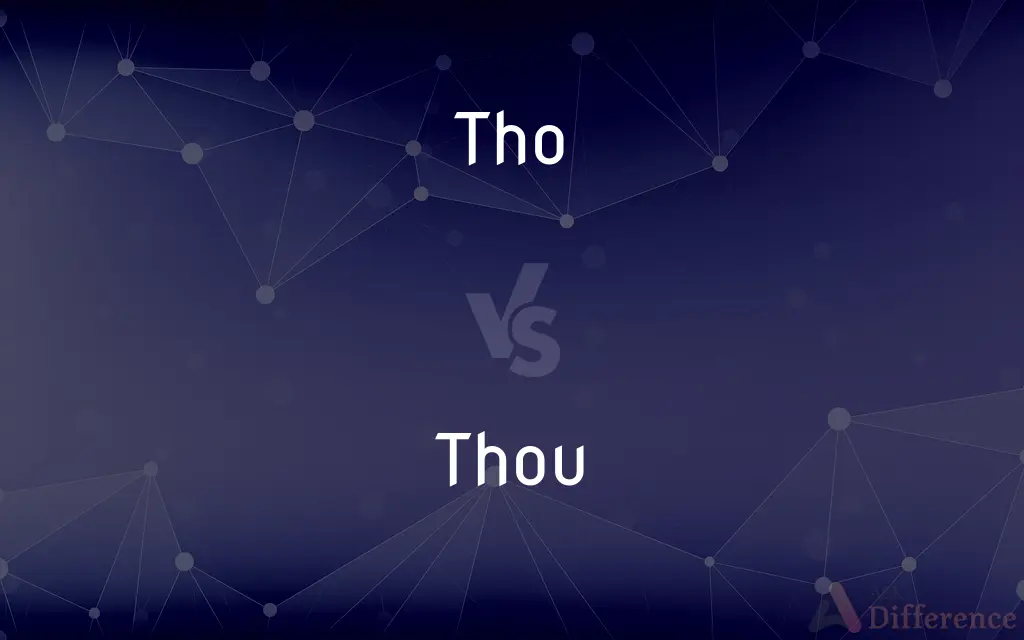Tho vs. Thou — What's the Difference?
By Tayyaba Rehman — Updated on November 23, 2023
"Tho" is a colloquial, shortened form of "though," indicating contrast or addition, while "thou" is an archaic or poetic second-person singular pronoun.

Difference Between Tho and Thou
Table of Contents
ADVERTISEMENT
Key Differences
Tho is an informal abbreviation of the word "though," often used in casual communication such as texting or social media. It is a conjunction used to introduce a contrasting part of a sentence. In contrast, thou is an old English pronoun that was used to address a single person. It is equivalent to the modern "you" but was singular and informal.
The usage of tho is prevalent in modern, informal contexts and is often chosen for its brevity in digital communication. It retains the same meaning as "though," showing contrast or an unexpected outcome. Thou, however, is rarely used in everyday conversation and is mostly found in historical texts, religious scriptures, and poetry, reflecting its archaic nature.
Tho is a contemporary adaptation, showcasing the evolving nature of language in informal settings. It's a part of modern slang and colloquial speech. On the other hand, thou is a term deeply rooted in historical English, often associated with Shakespearean language, and is considered formal and outdated in current usage.
In terms of pronunciation, tho is pronounced similarly to the first syllable of "though," reflecting its abbreviated nature. Thou, however, has a distinct pronunciation, rhyming with words like "now" and "plow." This difference in pronunciation is a clear indicator of the differing roles and eras these words belong to.
To summarize, tho and thou serve very different functions and belong to different eras of the English language. Tho is a modern, informal abbreviation, while thou is an archaic form of address that has historical and literary significance.
ADVERTISEMENT
Comparison Chart
Meaning
Abbreviated form of "though"
Archaic second-person singular pronoun
Usage
Modern, informal communication
Historical, literary, and religious texts
Pronunciation
Similar to "though"
Rhymes with "now" and "plow"
Context
Casual, digital communication
Shakespearean language, formal contexts
Function
Conjunction indicating contrast
Singular, informal address equivalent to "you"
Compare with Definitions
Tho
Informal abbreviation of "though."
It's raining, but I'll go out tho.
Thou
Poetic and formal address.
Thou hast a gentle heart.
Tho
Used to introduce a contrasting idea.
I was tired, tho I finished the work.
Thou
Found in historical and religious texts.
Thou shalt not steal.
Tho
Expresses a mild surprise.
She won the game, tho she was the underdog.
Thou
Reflects old English language usage.
Dost thou understand me?
Tho
Used in informal, casual language.
The place is expensive, tho the food is good.
Thou
The word thou is a second-person singular pronoun in English. It is now largely archaic, having been replaced in most contexts by you.
Tho
Though.
Thou
Compare with thee
Thou art fair, O my beloved
Tho
(obsolete) Those; they.
Thou
A thousand
Two hundred thou
Tho
Then; thereupon.
Thou
A thousand, especially of dollars.
Tho
Alternative spelling of though
Thou
Form of {{glossary.
Tho
(dialectal) When.
Thou
(transitive) To address (a person) using the pronoun thou, especially as an expression of contempt or familiarity.
Don’t thou them as thous thee!
– a Yorkshire English admonition to overly familiar children
Tho
The.
Thou
(intransitive) To use the word thou.
Tho
Those.
This knowen tho that be to wives bound.
Thou
(Britain) A unit of length equal to one-thousandth of an inch (25.4 µm).
Tho
Then.
To do obsequies as was tho the guise.
Thou
(slang) A thousand, especially a thousand of some currency (dollars, pounds sterling, etc.).
Tho
Though.
Thou
The second personal pronoun, in the singular number, denoting the person addressed; thyself; the pronoun which is used in addressing persons in the solemn or poetical style.
Art thou he that should come?
Tho
A branch of the Tai languages
Thou
To address as thou, esp. to do so in order to treat with insolent familiarity or contempt.
If thou thouest him some thrice, it shall not be amiss.
Tho
Indicates an additional point.
He's late, tho he promised to be on time.
Thou
To use the words thou and thee in discourse after the manner of the Friends.
Thou
The cardinal number that is the product of 10 and 100
Thou
Archaic second-person singular pronoun.
Thou art wise beyond thy years.
Thou
Used in Shakespearean language.
Wherefore art thou, Romeo?
Common Curiosities
Is "tho" grammatically correct?
While not standard, "tho" is grammatically acceptable in informal contexts.
Why is "thou" not used anymore?
"Thou" fell out of use as modern English evolved, replaced by the more universal "you."
Can "thou" be used in modern English?
While grammatically correct, "thou" is archaic and rarely used today.
Is "tho" a recognized word in dictionaries?
"Tho" is recognized in some dictionaries as an informal variant of "though."
Can "tho" be used in academic texts?
No, "tho" is too informal for academic writing.
Is "tho" accepted in formal writing?
No, "tho" is considered informal and not suitable for formal writing.
What's the origin of "thou"?
"Thou" originates from Old English, used as a singular second-person pronoun.
Are "tho" and "though" interchangeable?
In informal contexts, yes, but "though" is preferred in formal writing.
Can "thou" be seen in modern poetry?
Yes, some poets use "thou" for its historical and stylistic value.
Is "tho" a recent development in language?
"Tho" has been used informally for some time, especially in digital communication.
Do English language learners need to know "thou"?
It's beneficial for understanding historical texts but not essential for modern conversation.
Is "thou" still used in religious contexts?
Yes, "thou" is often found in older religious texts and liturgy.
Is "thou" used in modern literature?
"Thou" is mostly used in historical or stylistic contexts in modern literature.
Are there modern translations for texts using "thou"?
Yes, many historical texts with "thou" have modern English translations.
Why do people use "tho" in texting?
"Tho" is used for brevity and informality in digital communication.
Share Your Discovery

Previous Comparison
Dissolution vs. Disintegration
Next Comparison
Lard vs. DrippingAuthor Spotlight
Written by
Tayyaba RehmanTayyaba Rehman is a distinguished writer, currently serving as a primary contributor to askdifference.com. As a researcher in semantics and etymology, Tayyaba's passion for the complexity of languages and their distinctions has found a perfect home on the platform. Tayyaba delves into the intricacies of language, distinguishing between commonly confused words and phrases, thereby providing clarity for readers worldwide.














































